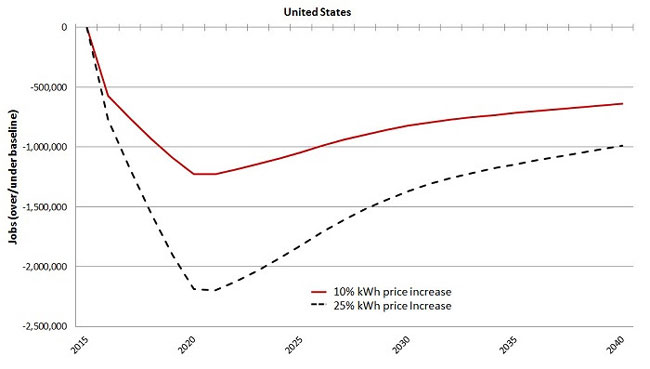The National Rural Electric Cooperative Association (NRECA) released a new economic study detailing a devastating relationship between higher electricity prices and job losses. The study, “Affordable Electricity: Rural America’s Economic Lifeline,” measures the impact of a 10 and 25% electricity price increase on jobs and gross domestic product (GDP) from 2020 to 2040.
According to the study, a 10% increase in electricity prices results in 1.2 million jobs lost in 2021. Nearly 500,000 of those lost jobs are in rural areas of the country, and even 20 years later, the economy fails to fully recover.
The impact of a 25% increase would be more damaging with 2.2 million jobs lost in 2021, with more than 890,000 of those occurring in rural areas.
“Affordable electricity is rural America’s economic lifeline. This study shines a light on the true, real-life cost of higher electricity prices – a cost that policymakers in Washington would do well to remember,” NRECA CEO Jo Ann Emerson said. “And federal regulations that result in higher electricity prices, such as the EPA’s proposed Clean Power Plan, could wipe out any modest gains rural America has made since the Great Recession.
“For 75 years, America’s not-for-profit electric cooperatives have been the guardians of rural America – bringing safe, affordable, and reliable power to more than 42 million Americans across 47 states. Affordable electricity has revolutionized the rural American landscape, creating jobs while taking agriculture and manufacturing operations to new heights. Rural America simply cannot afford to suffer hundreds of thousands of lost jobs because Washington regulators and policymakers fail to understand the impact their actions have on Main Street.”
In terms of national GDP from 2020 to 2040, a 10% increase results in a cumulative loss of $2.8 trillion and a 25% increase results in a cumulative $5.4 trillion loss.
The impact of higher costs on the electric bills of those who can least afford it will be devastating. On average, 23% of co-op households nationwide earn an annual income of less than $25,000. The average income for households served by electric cooperatives is 11.5% less than the national average.
The study was commissioned by NRECA and produced by Regional Economic Models. Previous NRECA research projected that electricity bills would increase by an average of 10% as a result of the EPA’s proposed Clean Power Plan.
The National Rural Electric Cooperative Association
www.nreca.coop/
Filed Under: News





